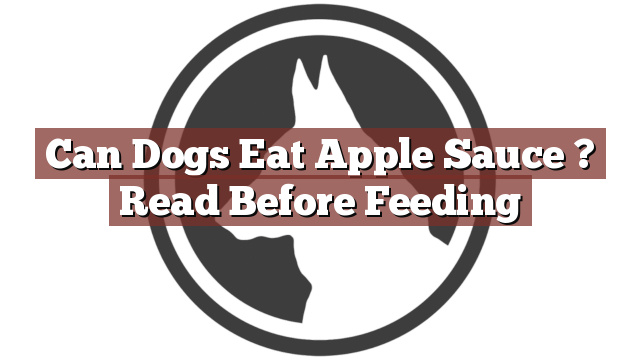Understanding Your Dog’s Dietary Needs
As a responsible dog owner, it is crucial to understand your furry friend’s dietary needs. While dogs primarily thrive on a diet consisting of meat, they can also benefit from certain fruits and vegetables. However, it is essential to be cautious about what human foods you share with your canine companion. Not all foods that are safe for us are safe for dogs, and some can even be toxic to them. Therefore, it is crucial to research and consult with a veterinarian before introducing any new food item into your dog’s diet.
Can Dogs Eat Apple Sauce? Read Before Feeding
Can dogs eat apple sauce? This is a common question that many dog owners ponder. The answer is both yes and no, depending on certain factors. Plain, unsweetened apple sauce can generally be safe for dogs to consume in moderation. Apples contain essential vitamins and minerals that can benefit your furry friend’s health. However, it is important to note that while the fruit itself is safe, apple sauce may contain added ingredients like sugar, spices, or artificial sweeteners that can be harmful to dogs.
Pros and Cons of Feeding Apple Sauce to Dogs
Pros: Apple sauce can provide some health benefits to dogs. Apples are a good source of dietary fiber, which can aid in digestion and help regulate bowel movements. They also contain antioxidants that can boost the immune system and promote overall well-being. Additionally, the natural sweetness of apples can make apple sauce a tasty and enticing treat for your four-legged companion.
Cons: Despite the potential benefits, there are some drawbacks to consider before feeding apple sauce to your dog. The added ingredients in store-bought apple sauce, such as sugar or artificial sweeteners, can be harmful to your pet. Excessive consumption of sugary foods can lead to weight gain, dental issues, and even diabetes in dogs. Additionally, some dogs may have an allergic reaction to apples, causing symptoms like itchiness, digestive upset, or respiratory problems. It is crucial to monitor your dog closely when introducing any new food and consult with a veterinarian if you have any concerns.
Conclusion: Tread Carefully and Consult Your Vet
Can a dog eat apple sauce? The answer is that it depends. If you decide to offer apple sauce to your dog, make sure it is plain, unsweetened, and free from any potentially harmful additives. Monitor your dog’s reaction closely after feeding it for the first time and look out for any signs of discomfort or allergic reactions. It is always best to consult with your veterinarian before making any significant changes to your dog’s diet. They can provide specific guidance based on your dog’s individual needs and help you make informed decisions about what foods are safe and beneficial for your furry friend.
Thank you for taking the time to read through our exploration of [page_title]. As every dog lover knows, our furry friends have unique dietary needs and responses, often varying from one canine to another. This is why it's paramount to approach any changes in their diet with caution and knowledge.
Before introducing any new treats or making alterations to your dog's diet based on our insights, it's crucial to consult with a veterinarian about [page_title]. Their expertise ensures that the choices you make are well-suited to your particular pet's health and well-being.
Even seemingly harmless foods can sometimes lead to allergic reactions or digestive issues, which is why monitoring your dog after introducing any new food item is essential.
The content provided here on [page_title] is crafted with care, thorough research, and a genuine love for dogs. Nevertheless, it serves as a general guideline and should not be considered a substitute for professional veterinary advice.
Always prioritize the expert insights of your veterinarian, and remember that the health and happiness of your furry companion come first.
May your journey with your pet continue to be filled with joy, love, and safe culinary adventures. Happy reading, and even happier snacking for your canine friend!

